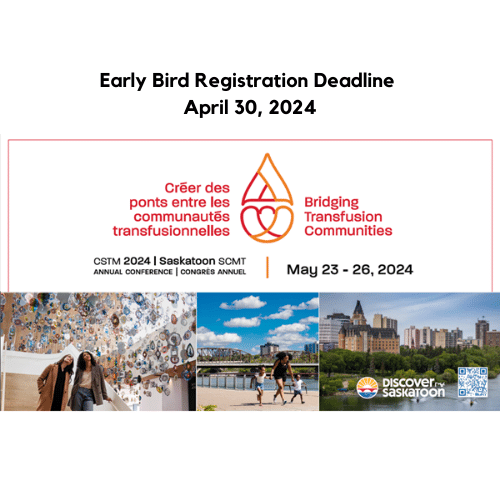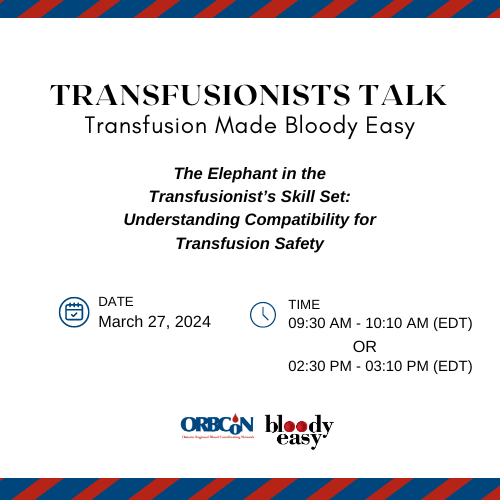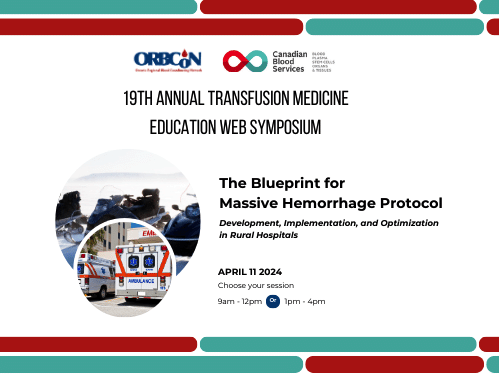Ministry of Health / ORBCoN Immune Globulin Quality Improvement Project
Laura Aseltine, ORBCoN Regional Project Coordinator, SW Office
In December 2020, the Office of the Auditor General of Ontario released the Value for Money Audit on Blood Management and Safety. The audit identified 13 recommendations for the Ministry of Health (MOH) to support an ongoing safe and stable supply of blood and blood products for Ontarians provided within a cost-effective and evidence-based context. Recommendation three spoke to management of supply and demand of immunoglobulins (IG) in Ontario, making sure they are available to those who need them most and avoiding the costs of wasted product, specifically “collect more complete data from hospitals on how immunoglobulins are being used and identify emerging conditions that may warrant inclusion in the provincial utilization guidelines.” 1
Currently in Ontario, paper request forms detailing the MOH approved IG indications are available for prescriber use when submitting requests to the Transfusion Medicine Laboratory (TML). Although all paper request forms must be submitted to TML for review and approval2 none of the stakeholders, including Canadian Blood Services (CBS), the MOH or the Ontario Regional Blood Coordinating Network (ORBCoN), collect comprehensive electronic data on how IG products are prescribed in hospitals (e.g., labelled medical indication for use, assessment of appropriate dose, or to what extent IG is being utilized to treat conditions for which there is limited/no evidence to support their use3). The lack of this data challenges investigation of the expanding IG utilization and the rate of guideline compliance. In the past, ORBCoN performed audits to evaluate practice and prepared formal reports to increase awareness of appropriate use4,5,6.
Upon release of the Value for Money Audit, ORBCoN set to work on the Immune Globulin Quality Improvement Project (IG QIP) to develop an IG request form electronic database to collect the rich information that is currently gathered on the paper MOH IG Request Forms. The team’s aim was to ensure that this process was mutually beneficial to both the MOH, as well as the hospital users choosing to share their IG data. Utilizing the Research Electronic Data Capture (REDCap®)7 platform (familiar to Ontario TMLs based on previous ORBCoN projects), a database was designed. The following beneficial features were implemented:
- Organizing the REDCap electronic record form to mirror the information collected on the paper MOH IG Request Form would limit TMLs searching sources/systems for the essential data.
- Embedding the IG “Dosing Using Adjusted Body Weight” calculator within the REDCap electronic record form facilitates real time data entry by end users, limiting the need to link to additional web-based programs.
- End users with established sophisticated electronic data sets in their Laboratory Information Systems can electronically upload IG data into REDCap, avoiding people resource intensive manual data entry.
- Site specific electronic alerts are generated when an IG request has reached its 6-month or one year renewal date, saving TMLs time (an alternative to manually searching paper MOH IG Request Forms) when determining requests requiring prescriber review.
- Providing templated reports for users who wish to download their IG data and present it to their transfusion committee or quality improvement teams to evaluate hospital utilization and workflow.
The MOH, via ORBCoN, has launched the IG QIP in response to recommendations within the Value for Money Audit, Blood Management and Safety1. Furthermore, to endorse best practice for hospitals and their patients, ORBCoN has developed an efficient means to delineate IG utilization based on current provincial guidelines and evolving evidence-based indications. At present, hospital participation is voluntary. As the benefits are realized, it is anticipated that adoption of the IG QIP process will grow.
If your hospital would like more information about the IG QIP, please reach out to Laura Aseltine (ORBCoN IG QIP project lead) at aseltinl@mcmaster.ca.
References
- Value-for-Money Audit: Blood Management and Safety (2020) [Internet]. Office of the Auditor General of Ontario. 2020. p. 1–68. Available from: Value-for-Money Audit: Blood Management and Safety (2020) (auditor.on.ca)
- The Ontario Regional Blood Coordinating Network. Ordering IG in Ontario [Internet]. 2018. Available from: https://transfusionontario.org/en/category/ivig-scig/ordering-igin-ontario/
- Shih AW, Jamula E, Diep C, Lin Y, Armali C, Heddle NM, et al. Audit of provincial IVIG Request Forms and efficacy documentation in four Ontario tertiary care centres. Transfus Med. 2017;27(2):122–31.
- ORBCON (Ontario Regional Blood Coordinating Network). Intravenous Immune Globulin (IVIG) 2012 Audit Report [Internet]. 2012. Available from: https://www.mendeley.com/catalogue/intravenous-immune-globulin-ivig-2012-audit-report/
- The Ontario Regional Blood Coordinating Network. Audit of Intravenous Immune Globulin (IVIG) Indications and Effectiveness in Ontario Tertiary Care Centres [Internet]. 2015. Available from: https://transfusionontario.org/wp-content/uploads/2020/05/Audit-of-Intravenous-Globulin-IVIG-Indications-and-Effectiveness-in-Ontario-Tertiary-Care-Centres-2015.pdf
- The Ontario Regional Blood Coordinating Network. IG QIP Project Protocol [Internet]. 2023. Available from: IG QIP – Transfusion Ontario
- PA Harris, R Taylor, BL Minor, V Elliott, M Fernandez, L O’Neal, L McLeod, G Delacqua, F Delacqua, J Kirby, SN Duda, REDCap Consortium, The REDCap consortium: Building an international community of software partners, J Biomed Inform. 2019 May 9 [doi: 10.1016/j.jbi.2019.103208]
Upcoming Events
CSTM 2024

Transfusionists Talk

19th Annual Transfusion Medicine Education Web Symposium

U of T

March 28, 2024 @12pm-1pm
Subscribe to U of T Transfusion Medicine Rounds mailing list to get registration details